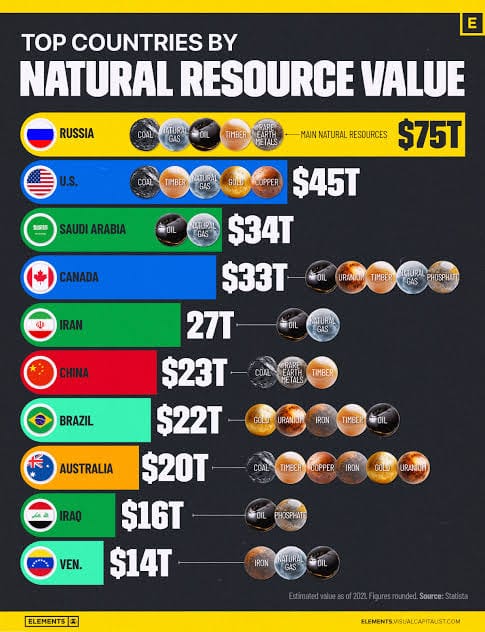Beneath the soil of some countries lies immense natural resources that fuel global economies, power industries, and shape geopolitics.
From vast oil reserves to coveted rare earth minerals, the wealth of these countries transcends traditional currency. But which nations top the list, and what makes their natural treasures so valuable?
Here’s a closer look at the 10 countries with the most valuable natural resources:
Russia
Russia has a remarkable $75.7 trillion in natural resources like coal, oil, gas, gold, and lumber. Russia also provides one-fifth of the world’s timber and is a global leader in gold reserves.
Other natural resources include iron ore, manganese, chromium, nickel, platinum, and titanium. It is the world’s second-largest producer of oil and the world’s largest producer of natural gas.
The country’s natural resources contribute an overwhelming 95.7% to its national wealth, with oil and gas leading the charge.
Read also: Top 9 coldest countries in the world
Top 10 longest bridges in Africa
United States
With an astounding $45 trillion in natural resources, the United States is one of the countries with the most natural resources.
The United States has an abundance of natural resources like minerals, energy, coal, copper, lead, iron, natural gas, lumber, bauxite, uranium, and forest resources. These Natural resources have played an important role in the United States’ economic and technical development.
Saudi Arabia
Saudi Arabia’s natural resources include natural gas, iron ore, gold, copper, and about 17% of the world’s total petroleum reserves valued at $34.4 trillion, about 240 trillion cubic feet.
In addition to energy, Saudi Arabia has abundant mineral resources, including niobium, feldspar, gypsum, salt, mica, sulfur, and tantalum.
Canada
Canada has 178.1 billion barrels of oil reserves, which is the second-largest amount in the world after Saudi Arabia and represents 17.8% of total oil reserves in the world with the total of its natural resource reserves worth a total of $33.2 trillion.
Canada also has the second-largest uranium deposits, the third-largest lumber output rate, and possesses enormous phosphate reserves.
Iran
Iran’s natural resources are valued at almost $27.3 trillion in total, and it has 16% of the natural gas deposits in the world. There currently as over 136.2 billion barrels of oil reserves in the nation, which is more than 10% of the world’s total oil reserves.
Other mineral resources of Iran are coal, oil, gas, lead, manganese, zinc, sulfur, chrome, copper, and iron ore. According to reports, Iran has started exploring the vast South Pars gas field in an attempt to find fresh deposits.
China
China has $23 trillion in total reserves and thirteen percent of the world’s total coal reserves are found in China’s entire coal deposits. Recently, shale gas reservoirs were found in the nation, which will increase the amount of money generated there.
Also Read: https://www.investopedia.com/articles/markets-economy/090516/10-countries-most-natural-resources.asp
China is also the world’s third-largest producer of iron ore and has substantial natural gas and oil deposits, magnesium, bauxite, diamonds, gold, lead, mercury, and phosphate rock.
Brazil
Brazil is known as the nation with the highest exporter of Timber worth $17.45 trillion, nearly 12.3% of the $17.45 trillion, and its whole natural resource base is valued at almost $21.8 trillion.
Also, Brazil has other natural resources like gold, diamonds, bauxite, iron, tin, and platinum. The nation is ranked number one for tantalite and niobium, second for kaolin and graphite, and third for talc, vermiculite, and aluminum reserves.
Australia
Australia’s vast coal, copper, wood, and iron reserves make it number eight among the 10 countries with the most valuable natural resources. Australia contributes 14.3% of the world’s gold output and 46% of the world’s uranium supply.
The country has plenty of gold, coal, natural gas, petroleum, and iron ore which drive most of the nation’s economic activity. Other valuable resources include rutile, uranium, nickel, bauxite, zinc, zircon, and ilmenite.
Iraq
Iraq has about 9% of global reserves that are shared by its oil deposits which total up to 115 billion barrels. Also. Iraq has large phosphate rock resources worth an estimated $1.1 trillion worldwide.
In addition to having five “supergiant” oil fields, it also contains some of the world’s greatest oil reserves, Iraq also has a wealth of natural gas, phosphate, and sulfur resources. It also produces electricity using hydroelectric resources, natural gas, and liquid fuels.
Venezuela
Venezuela ranks sixth in the world with an estimated 99 billion barrels or 7.4% of the world’s t
otal supply, and its total reserves are around $14.3 trillion.

Adeleke Damilola (ACTION) is a versatile content writer with expertise in news writing and a seasoned media professional and broadcast specialist. Currently serving as News Editor for DNews Info, Damilola is also the CEO of the ACTION brand, committed to shaping lives and establishing a legacy of excellence for present and future generations.
Discover more from DnewsInfo
Subscribe to get the latest posts sent to your email.






